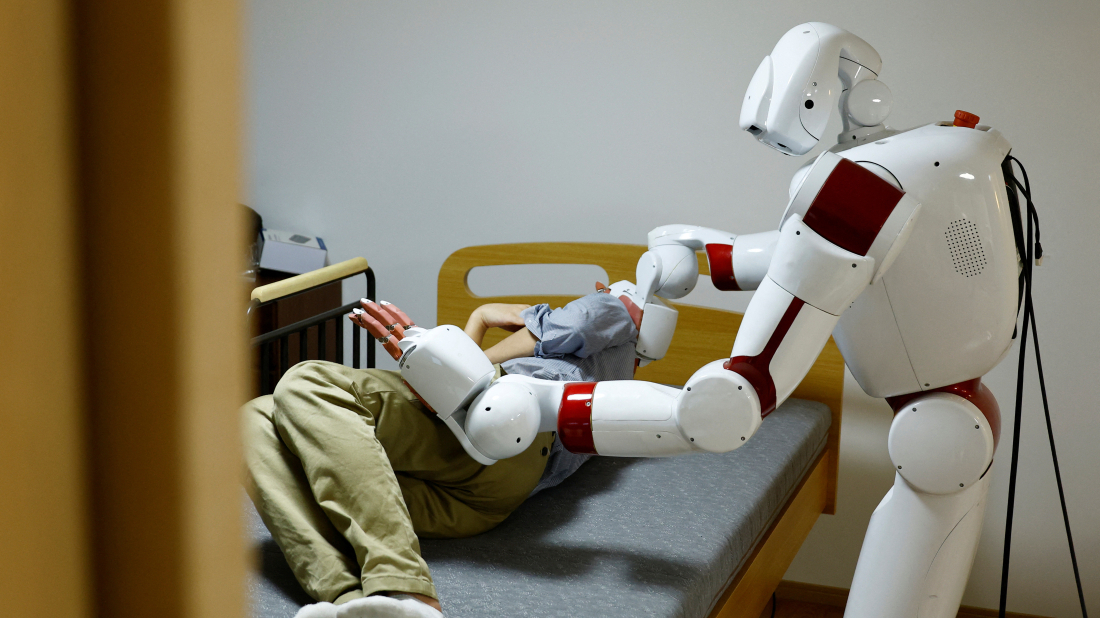Iran strikes: Why now and what next for the leadership in Tehran?
Journalist and International Affairs Commentator, Tom Gross, joined AnewZ from Tel Aviv to tell us why he thinks the attack happened now and whether t...
A robotic hand reaches out, adjusting a patient with careful precision. In a Tokyo lab, AIREC, an AI-driven humanoid, is being developed to assist Japan’s ageing population as the country faces a severe caregiver shortage.
Japan is ageing faster than almost any nation on Earth. The number of people aged 15-64—those who make up the workforce—is expected to shrink by 9.3% in the next decade, according to government data. Meanwhile, the elderly population continues to grow, straining the country’s already stretched caregiving system.
Unlike many Western nations, Japan has strict immigration controls, limiting foreign workers who could help bridge the gap. Instead, the government is betting on robots—not as a novelty, but as a necessity.
At Waseda University, researchers are developing AIREC, a humanoid robot designed to assist with daily care. From turning bedridden patients to helping them dress, the machine is built to perform delicate, hands-on tasks safely. It is part of a government-funded effort to revolutionise elder care with artificial intelligence.
Unlike traditional machines, AIREC isn’t just about automation—it’s about physical interaction. Most assistive robots work in controlled environments, but AIREC is being trained to sense human movements and react in real time.

“At the moment, robots still struggle to interact naturally with humans,” says Professor Shigeki Sugano, lead researcher at Waseda University. “The challenge isn’t just building a humanoid—it’s ensuring that the hardware and AI can work together to understand human behaviour.”
AIREC is already capable of helping patients sit up, put on socks, and perform simple household tasks like folding laundry and cooking scrambled eggs. Developers predict that by 2040, robots like AIREC will be assisting in care homes, with full-scale deployment expected by 2050.
Despite the rapid advancements, acceptance remains a challenge. In a Tokyo care home, 89-year-old Yukiko Namekata watches a robot perform a dance routine. Asked about the idea of robotic caregivers, she hesitates. "Isn’t it too early for that?"
Care workers also express mixed feelings. While robots could ease workloads, some fear the loss of human warmth—an essential part of caregiving.
Yet, as Japan’s caregiver shortage worsens, the presence of robots in hospitals and nursing homes may no longer be a choice, but a necessity.
AIREC is still in development, but its outstretched robotic hand symbolises more than just technology—it’s a glimpse into a future where caregiving is no longer just human.
Follow the latest developments and global reaction after the United States and Israel launched "major combat operations" in Iran, prompting retaliation from Tehran.
Tensions between the U.S. and Iran are escalating, with Washington ordering a significant military build-up in the region and multiple countries evacuating diplomatic staff amid fears of further instability.
Two people were killed and around 40 injured when a tram derailed in central Milan on Friday (27 February), a spokesperson for the local fire service said.
Pakistani air strikes hit a weapons depot on the western outskirts of Kabul overnight, triggering hours of secondary explosions that rattled homes across the Afghan capital and left residents fearing further violence.
Iran’s top diplomat said that the next round of nuclear talks is expected in less than a week after what he described as “progress in the most serious exchanges” between Tehran and Washington. The statement follows the third round of nuclear talks on Thursday (26 February) in Geneva.
South Korea will soon cease to be one of the few countries where Google Maps does not function fully, after its security-conscious government reversed a two-decade-old policy and approved the export of high-precision map data to overseas servers.
New research suggests 40,000-year-old carved objects from south-western Germany bear repeated marks arranged in organised sign sequences similar to early proto-cuneiform, although they are not regarded as a form of writing.
The chief executive of Google DeepMind, Demis Hassabis, has called for more urgent research into the risks posed by artificial intelligence, warning that stronger safeguards are needed as systems become more advanced.
NASA successfully completed a critical fueling rehearsal on Thursday (19 February) for its giant moon rocket, Artemis II, after earlier hydrogen leaks disrupted preparations for the next crewed lunar mission. The launch is scheduled for 6 March, according to the latest information from NASA.
ByteDance will take steps to prevent the unauthorised use of intellectual property on its artificial intelligence (AI) video generator Seedance 2.0, the Chinese technology firm said on Monday.
You can download the AnewZ application from Play Store and the App Store.

What is your opinion on this topic?
Leave the first comment